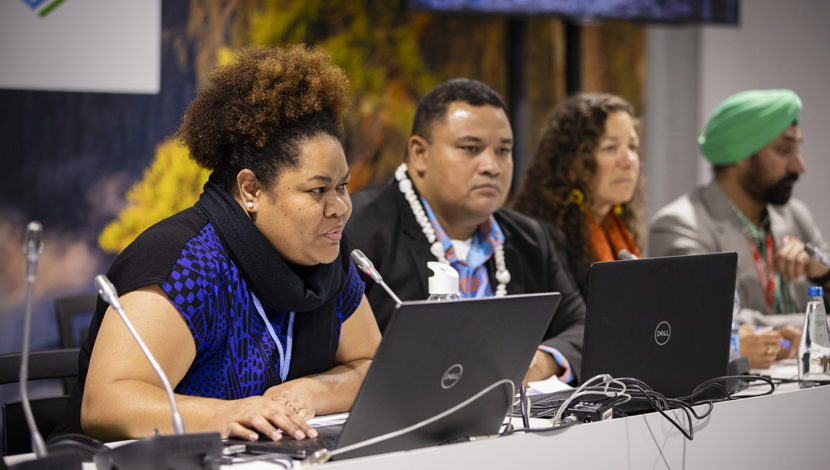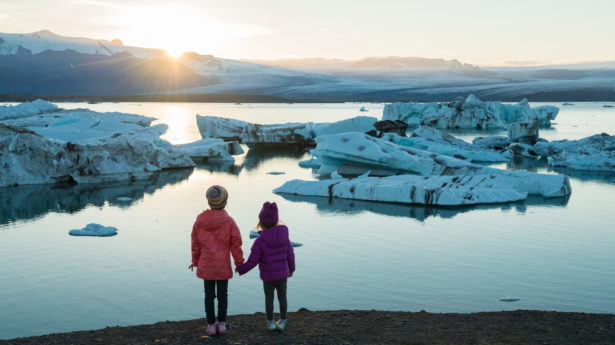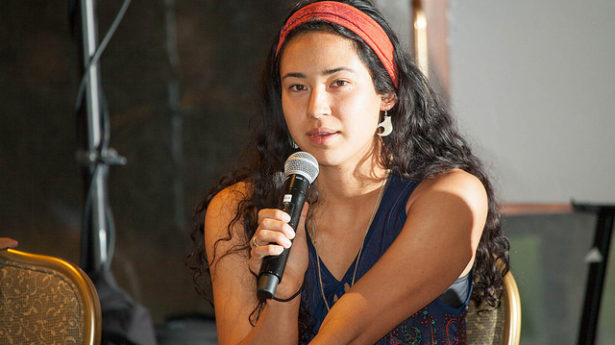The Unitarian Universalist Service Committee advances human rights through grassroots collaborations.
UUSC Supports Indigenous Leadership at COP25 International Climate Change Talks

By UUSC Staff on December 9, 2019
World leaders and members of civil society are gathered in Madrid Spain this week and next as part of the 25th United Nations Framework Convention on Climate Change (UNFCCC) Conference of Parties (COP) to discuss country commitments to address climate change. The annual COP meetings are a way for the 193 UN member countries to be held accountable for their commitments to address climate change. While not legally binding, the agreements that were reached during the creation of the UNFCCC require member countries to:
- Lower greenhouse gas emissions;
- Financially contribute to efforts by poorer nations to address climate change;
- Exchange knowledge and technology; and
- Build capacity around addressing loss and damage experienced as a result of climate change.
Representation from Indigenous and frontline communities is often limited. Without a seat at the table, so-called “climate solutions” such as hydropower dams or wind turbine farms, or state-sanctioned land grabs that see the conversion of natural forests for commercial purposes, can be encouraged by state actors, leading to devastating consequences. As a result, Indigenous peoples have been pushed away from their homes and forced into volatile situations and places, and in the direct path of disasters and climate impacts.
UUSC’s role at COP is to support the inclusion of Indigenous peoples to advocate for their right to self-determination and to amplify Indigenous-led organizing and community-based strategies to respond to their displacement and the ongoing loss and damage of their homes, cultural and traditional sites, food, and water. Supporting Indigenous peoples at COP means supporting them to speak their truth and inform the assumptions that are made about the reality of these so-called “climate solutions.” It also gives them an opportunity to connect with international allies for support and solidarity.
This year, we are sponsoring two of our partners from the Pacific to attend COP and contribute their valuable first-hand experience of relocation and the plight of Small Island States to the discussions and to support the Indigenous Peoples Platform, a formal platform for Indigenous peoples to engage with the United Nations Framework.
Makereta Waqavonovono, a legal and policy expert representing Pacific Tok, a community-based group doing climate advocacy in Fiji, is working with local partners in Fiji to organize community leaders around the consultation process for Fiji’s Planned Relocation Guidelines to ensure that the right to self-determination and cultural rights of Fiji’s Indigenous communities, who are at grave risk of being forcibly displaced, are upheld and protected. A video documenting their relocation efforts will be shared at COP as a resource for other communities to learn from.
Maina Talia represents the Tuvalu Climate Action Network (TuCAN), an NGO that supports and builds the capacity of Tuvalu’s civil society organizations to enhance their resilience to climate change. As co-chair of the Indigenous Peoples Platform, he will be helping to assert the platform’s position into the negotiations. He also serves as the Tuvalu Indigenous Focal Point and will be working with the Task Force on Displacement to consider the plight of Small Island States.
Further, we have partnered with MINGA Indigena, and their Indigenous People’s Summit taking place alongside COP. Focusing on Indigenous solutions to climate change, Indigenous leaders will share what is happening in their communities and will work to create a series of proposals which will be delivered to the COP. When the location for COP was moved from Chile to Spain weeks before the event, there was concern that many Indigenous communities would no longer be able to come and have their voice be heard. UUSC worked in coalition with other groups to ensure that Indigenous leaders had the resources they needed to meet in Madrid and inform the COP process.
UUSC’s work to ensure that those who have and will continue to suffer the most—and who have the most wisdom and resilience to share in this space—have a platform to speak about their lived experiences and their solutions is a responsibility required of us through our shared humanity.
It’s fitting that the first principle of Unitarian Universalism (the inherent worth and dignity of every person) and the seventh principle of Unitarian Universalism (respect for the interdependent web of all existence of which we are a part) bookend the core values UUs hold dear. Both of these principles encompass an intrinsic dedication to the individual as well as our communities and the environments we live in. UUSC and its partners are proud to support Indigenous communities on the frontlines of climate change, to humbly respect that they are living with the impacts right now, and that they possess the wisdom and knowledge to provide solutions that can move us forward.
Photo Credit: Joel Sheakoski
***
About UUSC: Guided by the belief that all people have inherent worth and dignity, UUSC advances human rights globally by partnering with affected communities who are confronting injustice, mobilizing to challenge oppressive systems, and inspiring and sustaining spiritually grounded activism for justice. We invite you to join us in this journey toward realizing a better future!

